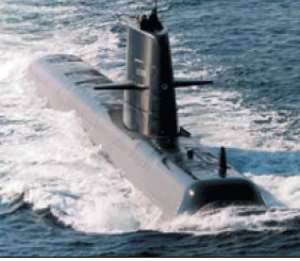
At least 20 people have died in an incident on a Russian nuclear submarine when a fire extinguishing system was switched on accidentally.
Russian Pacific Fleet spokesman Igor Dygalo said both sailors and shipyard workers died in the incident, which occurred during sea trials.
He said the submarine was not damaged and there had been no radiation leaks.
It is the worst incident for the navy since the sinking of the Kursk submarine in 2000, which left 118 dead.
Injured evacuated
Military prosecutors are investigating the incident, but the name and class of the submarine involved have not been officially revealed.
There were 208 people on board at the time, 81 of whom were servicemen.
Capt Dygalo said the fire extinguishing system "went off unsanctioned".
The BBC's Richard Galpin, in Moscow, says it is not clear why this would result in so many casualties.
Russian news agencies say the systems on submarines use chemical liquids and the injured are reported to be suffering from various degrees of poisoning.
The vessel, which had been undergoing sea trials in the Sea of Japan, has returned to port at Bolshoi Kamen, near Vladivostock, in the far eastern Primorskiy territory.
"I declare with full responsibility that the reactor compartment on the nuclear-powered submarine is working normally and the radiation background is normal," Capt Dygalo said, quoted by Itar-Tass news agency.
Twenty-one injured people were transferred from the submarine to the destroyer Admiral Tributs and taken to hospitals near Vladivostock.
Reports say the incident occurred in the nose of the submarine. The nuclear reactor, which is in the stern, was not affected.
Indian link
A shipyard source told the RIA Novosti news agency the vessel was the K-152 Nerpa, an Akula-class submarine, but this cannot be independently confirmed.
RIA said the trials were in the Japanese Sea and that the Nerpa was due to be leased to the Indian navy.
The agency quoted a Pacific Fleet source as saying the submarine would arrive back at its port at around 0900 GMT on Sunday, depending on weather conditions.
Russian President Dmitry Medvedev is being kept fully informed about the incident, his press service said.
Deputy Defence Minister Alexander Kolmakov and Navy Commander-in-Chief Vladimir Vysotsky are flying to the scene of the incident.
Russia's worst submarine disaster happened in August 2000, when the nuclear-powered Kursk sank in the Barents Sea. All 118 people on board died.
The then president, Vladimir Putin, was criticised for being slow to react to the incident and reluctant to call in foreign assistance.
The agency quoted a Pacific Fleet source as saying the submarine would arrive back at its port at around 0900 GMT on Sunday, depending on weather conditions.
Russian President Dmitry Medvedev is being kept fully informed about the incident, his press service said.
Deputy Defence Minister Alexander Kolmakov and Navy Commander-in-Chief Vladimir Vysotsky are flying to the scene of the incident.
Russia's worst submarine disaster happened in August 2000, when the nuclear-powered Kursk sank in the Barents Sea. All 118 people on board died.
The then president, Vladimir Putin, was criticised for being slow to react to the incident and reluctant to call in foreign assistance.




 Saglemi Housing Project will not be left to rot – Kojo Oppong Nkrumah
Saglemi Housing Project will not be left to rot – Kojo Oppong Nkrumah
 Transport fares hike: GPRTU issue two-day ultimatum
Transport fares hike: GPRTU issue two-day ultimatum
 ARC endorses Alan as presidential candidate – Buaben Asamoa
ARC endorses Alan as presidential candidate – Buaben Asamoa
 Akufo-Addo appoints Kwasi Agyei as new Controller and Accountant-General
Akufo-Addo appoints Kwasi Agyei as new Controller and Accountant-General
 PNC dismiss reports of mass resignations
PNC dismiss reports of mass resignations
 PAC advocates for revenue collectors to be engaged on commission basis, not full...
PAC advocates for revenue collectors to be engaged on commission basis, not full...
 Genser Energy commissions 110km of natural gas pipeline at Anwomaso
Genser Energy commissions 110km of natural gas pipeline at Anwomaso
 Naa Torshie calls for tolerance, peace ahead of 2024 election
Naa Torshie calls for tolerance, peace ahead of 2024 election
 Asantehene commends Matthew Opoku Prempeh for conceiving GENSER Kumasi Pipeline ...
Asantehene commends Matthew Opoku Prempeh for conceiving GENSER Kumasi Pipeline ...
 Let’s do away with ‘slash and burn politics’ in Ghana — Dr Adutwum
Let’s do away with ‘slash and burn politics’ in Ghana — Dr Adutwum
